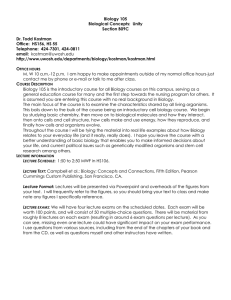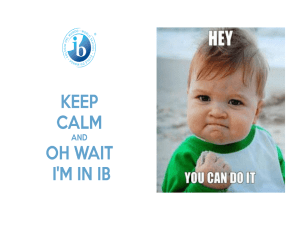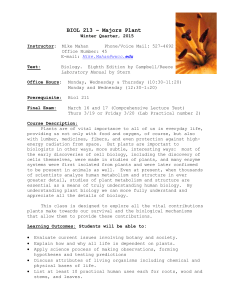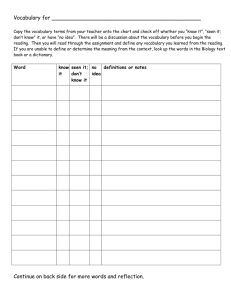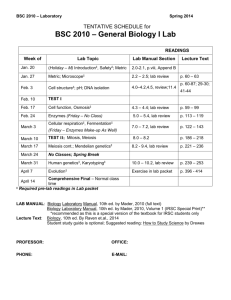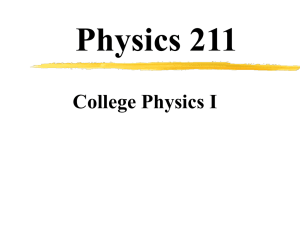Biology 105 Biological Concepts: Unity Section B09C Dr. Todd Kostman
advertisement
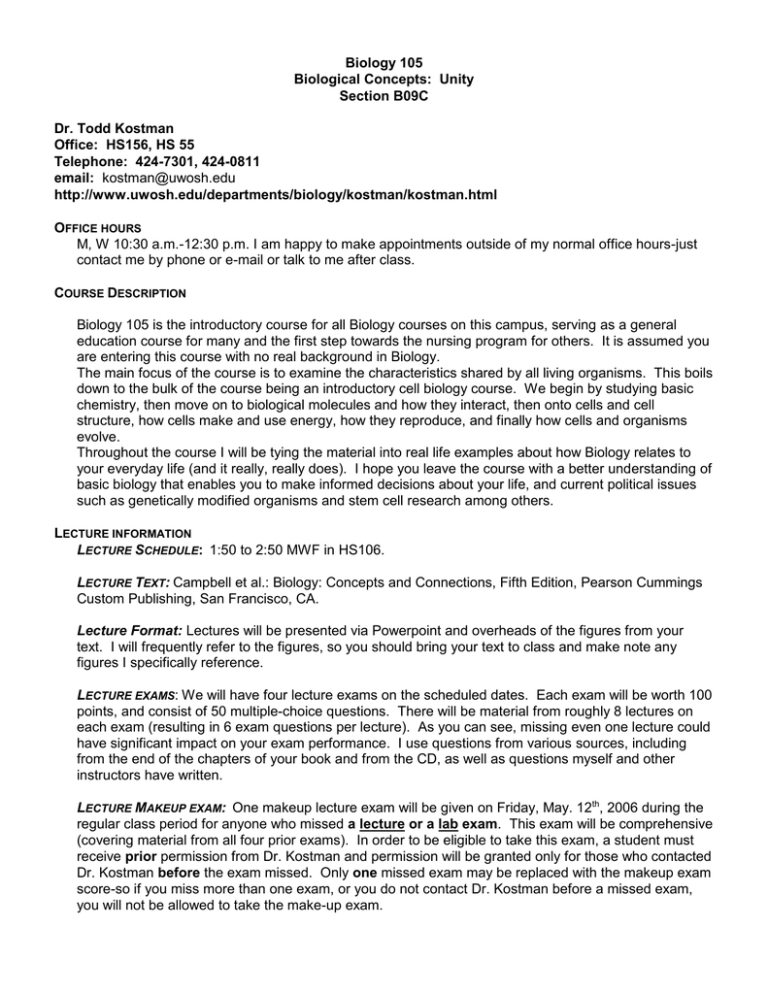
Biology 105 Biological Concepts: Unity Section B09C Dr. Todd Kostman Office: HS156, HS 55 Telephone: 424-7301, 424-0811 email: kostman@uwosh.edu http://www.uwosh.edu/departments/biology/kostman/kostman.html OFFICE HOURS M, W 10:30 a.m.-12:30 p.m. I am happy to make appointments outside of my normal office hours-just contact me by phone or e-mail or talk to me after class. COURSE DESCRIPTION Biology 105 is the introductory course for all Biology courses on this campus, serving as a general education course for many and the first step towards the nursing program for others. It is assumed you are entering this course with no real background in Biology. The main focus of the course is to examine the characteristics shared by all living organisms. This boils down to the bulk of the course being an introductory cell biology course. We begin by studying basic chemistry, then move on to biological molecules and how they interact, then onto cells and cell structure, how cells make and use energy, how they reproduce, and finally how cells and organisms evolve. Throughout the course I will be tying the material into real life examples about how Biology relates to your everyday life (and it really, really does). I hope you leave the course with a better understanding of basic biology that enables you to make informed decisions about your life, and current political issues such as genetically modified organisms and stem cell research among others. LECTURE INFORMATION LECTURE SCHEDULE: 1:50 to 2:50 MWF in HS106. LECTURE TEXT: Campbell et al.: Biology: Concepts and Connections, Fifth Edition, Pearson Cummings Custom Publishing, San Francisco, CA. Lecture Format: Lectures will be presented via Powerpoint and overheads of the figures from your text. I will frequently refer to the figures, so you should bring your text to class and make note any figures I specifically reference. LECTURE EXAMS: We will have four lecture exams on the scheduled dates. Each exam will be worth 100 points, and consist of 50 multiple-choice questions. There will be material from roughly 8 lectures on each exam (resulting in 6 exam questions per lecture). As you can see, missing even one lecture could have significant impact on your exam performance. I use questions from various sources, including from the end of the chapters of your book and from the CD, as well as questions myself and other instructors have written. LECTURE MAKEUP EXAM: One makeup lecture exam will be given on Friday, May. 12th, 2006 during the regular class period for anyone who missed a lecture or a lab exam. This exam will be comprehensive (covering material from all four prior exams). In order to be eligible to take this exam, a student must receive prior permission from Dr. Kostman and permission will be granted only for those who contacted Dr. Kostman before the exam missed. Only one missed exam may be replaced with the makeup exam score-so if you miss more than one exam, or you do not contact Dr. Kostman before a missed exam, you will not be allowed to take the make-up exam. Cell Phones: All cell phones must be turned off during lecture and laboratory time. If you must leave it on in case of an EMERGENCY call (i.e. life or death), set it to vibrate. Cell phones going off during lectures or lecture exams will be confiscated and returned after the period is over. LABORATORY INFORMATION Laboratory meeting times: There are seven lab sections, B01-B07 that correspond to this lecture. You need to attend the lab section you are signed into as space is limited. Labs will meet each week at the assigned time in Room 211 and be two hours in length-assume each lab will take the entire period. You will receive a lab syllabus from your lab instructor with more details on how your lab section will be conducted. Labs cannot be made-up as there is extensive preparation necessary by our staff for each lab. LABORATORY TEXT: Holton and Charley-Johnson: BIO 105: Concepts in Biology: Unity: Laboratory Manual. Bring it (along with lecture text) to every laboratory meeting. LABORATORY EXAMS: Three laboratory exams (worth 100 pts each) will be administered during lecture periods (see schedule). Lab exams will consist of 40 multiple-choice questions. A missed exam will result in a score of zero for that exam, unless you qualify for the makeup exam. LABORATORY GRADE: You will have 400 points from the lab-300 points from the lab exams and 100 points that will be assigned by your lab instructor. GRADING COURSE GRADE: There are a total of 800 points possible for the semester (400 points from lecture exams, 300 points from lab exams, and 100 points from lab). I will calculate your grade by dividing the total number of points you earn over the semester by 800, which will yield a percentage. This percentage will be converted into a letter grade using the scale below: GRADING SCALE: 100-90% = A 89%-87% = AB 86-80% = B 79-77% = BC 76-70% = C 69-67% = CD 66-60% = D <60% = F Accessing Grades and Class Information I have set up this course on the D2L site and will post all grades there. In addition, I will also post messages to the class, sample exams, and review sheets over the course of the semester. If you have any questions or problems using the site please see me. Supplemental Instruction: We are fortunate to be a part of a program called "Supplemental Instruction" that provides a student peer, Ms. Amanda Wolf, who will attend the class and offer weekly review sessions that will help you learn how to learn the material. This program has been proven to be very successful on this campus and others and I strongly encourage you to use this resource. More information is attached to this syllabus and Amanda will be talking to you at the end of the first class period to schedule weekly meeting times. STATEMENT ON ACADEMIC DISHONESTY Students are referred to the University of Wisconsin Oshkosh Student Discipline Code as detailed in specific provisions of Chapter 14 of the State of Wisconsin Administrative Code. Any student(s) found in violation of any aspect of the above Code (as defined in sections UWS 14.02 and 14.03) will receive a sanction as detailed in UWS 14.05 and 14.06. Examples of violations include: looking at another student’s exam or answer sheet and copying the answers during and exam, talking or whispering to another student during an exam,, and receiving text messages during an exam on an electronic device. Sanctions range from a grade of zero for the assignment in question to an oral reprimand to expulsion from the University of Wisconsin Oshkosh. Students have the right to request a hearing and to appeal sanctions (as defined in UWS 14.08-14.10). Lecture and Laboratory Schedule-Biology 105 Spring 2006 Date Lecture Topic Text Reading 1 2.1-2.9 Jan. 30 Feb. 1 Feb. 3 Syllabus, Overview of Science and Biology Basic Chemistry: Elements, Atoms, and Bonds Water, Chemical Reactions Feb. 6 Molecules 3.1-3.7 Feb. 8 Feb. 10 Molecules Introduction to Cells 3.8-3.16 4.1-4.5 Feb. 13 Organelles 4.6-4.12 Feb. 15 Feb. 17 Organelles Energy and Enzymes 4.13-4.19 5.1-5.9 Feb. 20 Membrane structure and function 5.10-5.14 Feb. 22 Feb. 24 Transport and Osmosis Lecture Exam I (lectures1-9) 5.15-5.21 Feb. 27 March 1 March 3 Cell Respiration I Cellular Respiration II Cellular Respiration III 6.1-6.6 6.7-6.12 6.13-6.16 Lab Topic No lab 2.10-2.17 Exercise 1: Being a scientist Exercise 2: Infectious disease; start Exercise 3 Exercise 3: Mystical molecules Exercise 4: Enzymes March 6 Lab Exam I (labs 1-3) Exercise 5: Osmosis and diffusion March 8 March 10 Photosynthesis I Photosynthesis II March 1317 Spring Break March 20 March 22 March 24 Photosynthesis III Cell Cycle, Mitosis, Cytokinesis Meiosis March 27 March 29 March 31 Lecture Exam II (lectures 10-17) Chromosomes, gametes, crossing jordan Cancer and birth defects 8.13-8.18 8.19-8.23 April 3 Mendel I 9.1-9.10 April 5 April 7 Mendel II: Genotypes and phenotypes Mendelian Genetics III: Chromosomes and Inheritance 9.11-9.17 9-.18-9.24 April 10 April 12 April 14 Review genetics DNA and DNA replication Lecture Exam III (lectures 18-24) April 17 April 19 April 21 Lab Exam II (labs 4,5,6,7) Transcription and Translation Mutations and viruses 10.6-10.16 10.17-10.23 April 24 Gene regulation 11.1-11.8 April 26 April 28 Evolution I: Darwin and populations Evolution II 13.1-13.8 13.9-13.18 May 1 Evolution III-species and speciation 14.1-14.10 May 3 May 5 Evolution IV: Macroevolution Course wrap up and review 14.11-15.5 7.1-7.4 7.5-7.9 7.10-7.14 8.1-8.7 8.12 Exercise 6: Respiration Exercise 7: Photosynthesis Exercises 8 and 9: Two defects, did one cause the other? & The first steps in genetic engineering Continue Exercise 9 10.1-10.5 Continue Exercises 8 and 9 Finish Exercise 9; do Exercise 10: a quick exercise in selection Exercise 11: Species: products of evolution Finish exercises 8; Discuss results, assessment exam May 8 May 10 May 12 Lab Exam III (labs 8,9, 10, and 11) Lecture Exam IV (lectures 25-33) Make-up Exam (comprehensive) * * No Labs Lab Section Meeting Times and Lab Instructors: Spring 2006 Section Meeting Day/Time Instructor Section Meeting Day/Time Instructor A01L A02L A03L A04L A05L A06L A07L Charley-Johnson Bosma Beard Bosma Bosma Bosma Kostman Mon. 10:20-12:20 Mon. 12:40-2:40 Tu. 8-10 Tu. 1:20-3:20 Wed. 12:20-2:20 Wed. 12:40-2:40 Th. 8-10 Charley-Johnson Beard Beard Kostman Bosma Beard Bosma B01L B02L B03L B04L B05L B06L B07L Mon. 8-10 Mon. 3-5 Tu. 11-1 Wed. 8-10 Wed. 3-5 Th. 11:10-1:10 Th. 1:20-3:20 Supplemental Instruction (SI) for Biology 105 Dr. Kostman Jessica Burki, Student SI Leader E-mail: burkij24@uwosh.edu Frequently Asked Questions What is SI? Supplemental Instruction (SI) is a series of weekly review sessions for students taking historically difficult courses. SI is provided for all students who want to improve their understanding of course material and improve their grades. Attendance at SI sessions is voluntary. For you the student, it’s a chance to get together with people in your class to compare notes, to discuss important concepts, to develop strategies for studying the subject, and to test yourselves before your professor does. At each session you will be guided through this material by your SI leader, a competent student who has previously taken the course. What is an SI leader? Have you ever wished you could do something over, knowing what you know now? SI leaders are students themselves and are prepared to share with you what they have learned over the years about how to study. They know the course content and are anxious to help guide you through it. They’ll be in class with you every day, hearing what you hear and reading what you read. What they won’t do is lecture; their job is to help you think about the lectures you hear and the books you read, and then put it altogether during the SI review sessions. SI can help you learn course material more efficiently. When do SI review sessions start? On the first day of class you will fill out a short survey to let the SI leader know your class schedule. Each SI leader will set up two or three review sessions each week at times that are best for the majority of students taking the class. You can attend one, two, or all three (the choice is yours) and each one will be different because you’ll have new material to discuss. SI review sessions are informal. Bring your notes; bring your textbook; bring your questions. What’s in it for me? If you attend SI sessions regularly, chances are you’ll earn a better grade. You’ll have developed a better understanding of course content as well as more effective ways of studying. This will help you in other classes also.
